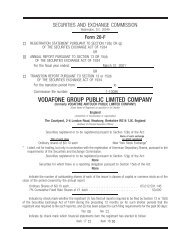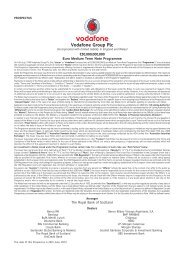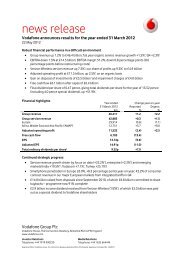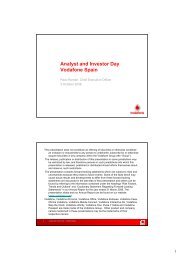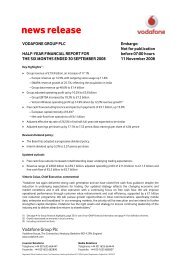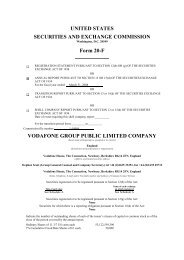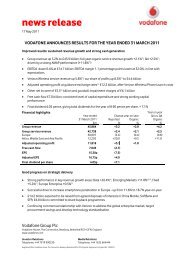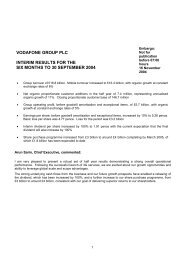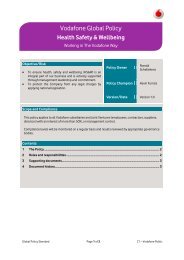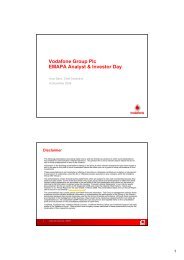Create successful ePaper yourself
Turn your PDF publications into a flip-book with our unique Google optimized e-Paper software.
Taxation<br />
The Group’s tax charge on ordinary activities is <strong>the</strong> sum of <strong>the</strong> total current and<br />
deferred tax charges. The calculation of <strong>the</strong> Group’s total tax charge necessarily<br />
involves a degree of estimation and judgement in respect of certain items whose<br />
tax treatment cannot be finally determined until resolution has been reached with<br />
<strong>the</strong> relevant tax authority or, as appropriate, through a formal legal process. The final<br />
resolution of some of <strong>the</strong>se items may give rise to material profit and loss and/or<br />
cash flow variances. See “Financial Position and Resources” on page 54.<br />
The complexity of <strong>the</strong> Group’s structure following its geographic expansion makes<br />
<strong>the</strong> degree of estimation and judgement more challenging. The resolution of<br />
issues is not always within <strong>the</strong> control of <strong>the</strong> Group and it is often dependent<br />
on <strong>the</strong> efficiency of <strong>the</strong> legal processes in <strong>the</strong> relevant taxing jurisdictions in<br />
which <strong>the</strong> Group operates. Issues can, and often do, take many years to resolve.<br />
Payments in respect of tax liabilities for an accounting period result from payments<br />
on account and on <strong>the</strong> final resolution of open items. As a result, <strong>the</strong>re can be<br />
substantial differences between <strong>the</strong> tax charge in <strong>the</strong> Consolidated Income<br />
Statement and tax payments.<br />
Significant items on which <strong>the</strong> Group has exercised accounting judgement include<br />
a provision in respect of an enquiry from UK HMRC with regard to <strong>the</strong> CFC tax<br />
legislation (see note 32 to <strong>the</strong> Consolidated Financial Statements), potential tax<br />
losses in respect of a write down in <strong>the</strong> value of investments in Germany (see note<br />
6 to <strong>the</strong> Consolidated Financial Statements) and litigation with <strong>the</strong> Indian tax<br />
authorities in relation to <strong>the</strong> acquisition of <strong>Vodafone</strong> Essar (see note 32 to <strong>the</strong><br />
Consolidated Financial Statements). The amounts recognised in <strong>the</strong> Consolidated<br />
Financial Statements in respect of each matter are derived from <strong>the</strong> Group’s best<br />
estimation and judgement, as described above. However, <strong>the</strong> inherent uncertainty<br />
regarding <strong>the</strong> outcome of <strong>the</strong>se items means eventual resolution could differ from<br />
<strong>the</strong> accounting estimates and <strong>the</strong>refore impact <strong>the</strong> Group’s results and cash flows.<br />
Recognition of deferred tax assets<br />
The recognition of deferred tax assets is based upon whe<strong>the</strong>r it is more likely<br />
than not that sufficient and suitable taxable profits will be available in <strong>the</strong> future,<br />
against which <strong>the</strong> reversal of temporary differences can be deducted.<br />
Recognition, <strong>the</strong>refore, involves judgement regarding <strong>the</strong> future financial<br />
performance of <strong>the</strong> particular legal entity or tax group in which <strong>the</strong> deferred<br />
tax asset has been recognised.<br />
Historical differences between forecast and actual taxable profits have not<br />
resulted in material adjustments to <strong>the</strong> recognition of deferred tax assets.<br />
Revenue recognition and presentation<br />
Revenue from mobile telecommunications comprises amounts charged to<br />
customers in respect of monthly access charges, airtime charges, messaging,<br />
<strong>the</strong> provision of o<strong>the</strong>r mobile telecommunications services, including data services<br />
and information provision, fees for connecting users of o<strong>the</strong>r fixed line and mobile<br />
networks to <strong>the</strong> Group’s network, revenue from <strong>the</strong> sale of equipment, including<br />
handsets, and revenue arising from <strong>the</strong> Group’s partner network agreements.<br />
Arrangements with multiple deliverables<br />
In revenue arrangements including more than one deliverable, <strong>the</strong> arrangement<br />
consideration is allocated to each deliverable based on <strong>the</strong> fair value of <strong>the</strong><br />
individual element. The Group generally determines <strong>the</strong> fair value of individual<br />
elements based on prices at which <strong>the</strong> deliverable is regularly sold on a<br />
standalone basis, after considering volume discounts where appropriate.<br />
Deferral period<br />
Customer connection fees, when combined with related equipment revenue,<br />
in excess of <strong>the</strong> fair value of <strong>the</strong> equipment are deferred and recognised over <strong>the</strong><br />
expected life of <strong>the</strong> customer relationship. The life is determined by reference<br />
to historical customer churn rates. An increase in churn rates would reduce <strong>the</strong><br />
expected customer relationship life and accelerate revenue recognition.<br />
Historically, changes to <strong>the</strong> expected customer relationship lives have not had<br />
a significant impact on <strong>the</strong> Group’s results and financial position.<br />
Any excess upgrade or tariff migration fees over <strong>the</strong> fair value of equipment<br />
provided are deferred over <strong>the</strong> average upgrade or tariff migration period<br />
as appropriate. This time period is calculated based on historical activity of<br />
customers who upgrade or change tariffs. An increase in <strong>the</strong> time period would<br />
extend <strong>the</strong> period over which revenue is recognised.<br />
Presentation<br />
When deciding <strong>the</strong> most appropriate basis for presenting revenue or costs of<br />
revenue, both <strong>the</strong> legal form and substance of <strong>the</strong> agreement between <strong>the</strong> Group<br />
and its business partners are reviewed to determine each party’s respective role in<br />
<strong>the</strong> transaction.<br />
Where <strong>the</strong> Group’s role in a transaction is that of principal, revenue is recognised<br />
on a gross basis. This requires revenue to comprise <strong>the</strong> gross value of <strong>the</strong><br />
transaction billed to <strong>the</strong> customer, after trade discounts, with any related<br />
expenditure charged as an operating cost.<br />
Where <strong>the</strong> Group’s role in a transaction is that of an agent, revenue is recognised<br />
on a net basis, with revenue representing <strong>the</strong> margin earned.<br />
<strong>Vodafone</strong> Group Plc Annual Report 2008 87




